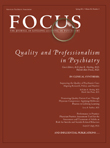Promoting Quality Patient Care Through Physician Competence: Applying Deliberate Practice to Lifelong Learning
Abstract
Poor-quality patient care can result from issues pertinent to the health system, patients, or the competence of physicians. A competent physician possesses and demonstrates the special knowledge, skills, attitudes, and behaviors required to provide quality patient care. Physician competence is a continuous, evolving concept driven at least in part by peers and patients, and, in our current era of accountability, it must be demonstrated in practice and documented objectively. Physician competence is at the center of current training program accreditation and board certification and maintenance of certification standards. Problems in physician competence can result from insufficient training; inadequate self-assessment; the negative effects of time; or failure to follow evidence-based standards of care, consider patient perspectives about care, consider the feedback from peers, or adhere to appropriate standards of professional conduct. Problems in physician competence can be addressed by a carefully designed program of lifelong learning that promotes professionalism, quality improvement, and the demonstration of acceptable medical knowledge. The principles of deliberate practice can be used to overcome significant challenges to lifelong learning, advance physician competence, and promote quality patient care.



